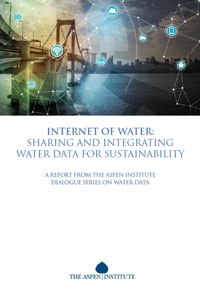Nicholas Institute for Environmental Policy Solutions
Publisher
This report from the Aspen Institute Dialogue Series on Water Data lays out a vision for a national policy framework that addresses institutional barriers to increasing the integration of water data and information to support sustainable water management. In the United States, data to manage water supplies and pursue innovative solutions to meet water management challenges are lacking or are not in a format that is easily accessible or understandable, and there are often strong disincentives, fears, and concerns about sharing the data. To address this challenge, the Aspen Institute Energy and Environment Program in partnership with the Nicholas Institute for Environmental Policy Solutions and Redstone Strategy Group convened the Aspen Institute Dialogue Series on Water Data. The report highlights the dialogue’s principle-based blueprint recommending a three-step plan to design and launch an “Internet of Water”—a network of interconnected data producers, hubs, and users—that will enable real-time collection and transmission of water-related data and information—a prerequisite for revolutionizing how water resources are managed and situated to address prevalent water problems such as extreme flooding, scarcity, and contamination as well as for restoring aquatic systems. The report makes three key findings: (1) the value of open, shared, and integrated water data has not been widely quantified, documented, or communicated; (2) the most necessary step in using water data for sustainability is making public water data open by default, discoverable, and digitally accessible; and (3) water data could be most effectively integrated through an internet of water. The report recommends facilitation of open water data, integration of existing public water data and development of tools to connect data producers and users as well as regional-data-sharing communities that can address near-term water management problems for key sectors.



